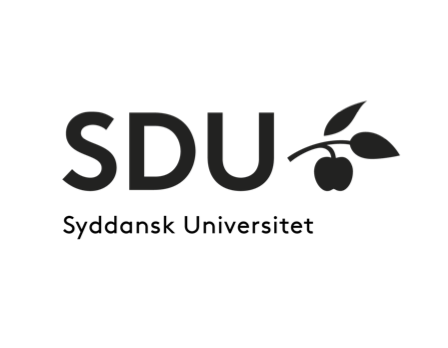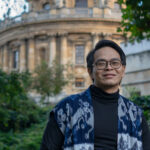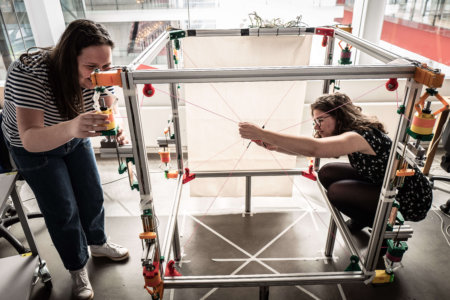The Faculty of Engineering at the University of Southern Denmark (SDU) is a favourite of international students for many reasons. SDU is ranked the 13th most sustainable university on the UI Green Metric and #295 on Times Higher Education’s World University Rankings 2023. It offers a variety of programmes in English. Inclusive and adaptable, this is a place where there is plenty of academic and career support to help students lay the groundwork for the rest of their lives.
What they’ll remember most as they carve dynamic careers. however, is the people. Three out of four engineering students at SDU in Sønderborg are international students, making it one of Europe’s most global campuses. “The international environment was something that attracted me a lot — learning from different cultures, different ways of thinking and different ways of communicating allowed me to have a wider perspective on teamwork as well as communication skills, something that I use every day in my current job,” says José Sánchez, who has a BSc and MSc in Mechatronics.
For Yasser Mohamed Eldemerdash, who studied mechatronics at the Sønderborg campus, it was a combination of the course, facilities, campus and international environment that drew him to SDU. “I was interested in robotics. However, Mechatronics is a broader umbrella from which you can specialise later in robotics or other fields,” he says. “The UniTest was also a good chance to see the university and SDU was kind enough to take us on a tour of the campus. I still remember learning then that the campus has 1,200 students from 60 different nationalities, which made me realise that it is going to be an international environment. I appreciate the multicultural community.”
The international campus in Sønderborg is filled with people from all over the world, exposing students to different cultures and a wide variety of individuals. “SDU Sønderborg is located on the border between Denmark and Germany,” says Henrik Bindslev, Dean of the faculty of Engineering. “It is located in the heart of a high-tech cluster of industries that are global market leaders, amongst others in rapid-growing areas such as e-mobility and sustainable energy technologies. This location shapes who we are. Our research and our education are highly international, with close collaboration with partners across the border and indeed globally.”
The Sønderborg campus is equipped with quiet spaces for students to concentrate or wind down as well as group rooms to work on projects. Labs have state-of-art tools that allow students to realise their visions and gain insights into what they’ll likely use in their future professions. “Very often for the semester projects, we will require different tools, mechanical and electronic tools, or even CNC and 3D printers,” says Sánchez. “The campus allowed the students to use these tools and work at any hours of the day and the weekend, giving us a lot of flexibility on when and how long we can work on the projects.”
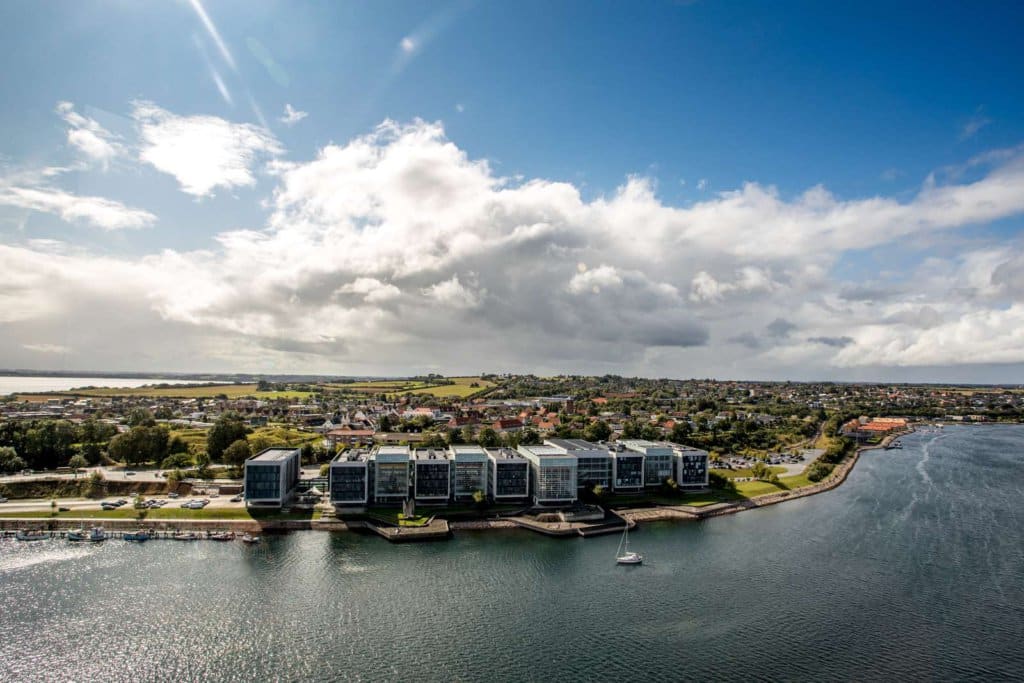
The SDU Sønderborg campus is uniquely located on the border between Denmark and Germany. Source: University of Southern Denmark
The Faculty of Engineering at SDU offers a range of intriguing programmes with small classes that enable student-teacher relationships that are both professional and informal. “When I visited my brother who was studying at the Odense campus, I realised the great environment he had and he explained how his education was structured,” says Sánchez. “I then researched which universities in Denmark that offer Mechanical Engineering programmes and I came across SDU Sønderborg’s Mechatronics programme. I was quite intrigued by their offering and decided to apply after visiting the campus and having a talk with the recruitment team.”
What Sánchez loves most about his programme now is how hands-on it is. “One of the main reasons I decided to apply to SDU was their approach to team projects” says Sánchez. “I have always enjoyed working in teams and the opportunity to share and learn from others was very exciting.”
As for MSc in Mechatronics (Embedded Systems) graduate Ahmed Mohamed Ibrahim Fayed, his favourite classes were a combination of theory and hands-on learning. “They focused on programming and software architecture like Software for Embedded Systems and Embedded Software Design,” he says. “I also liked classes where we get to apply the theoretical knowledge in labs or other forms such as Control Systems and Distributed Embedded Systems. I also enjoyed the Mechatronics Design and Build course where I was able to work with a team of my colleagues on a very interesting project throughout two semesters.”
Opportunities to work with industry experts improve your chances of landing a job in Denmark. “I have a job as a system engineer in Circle Consult at the moment, more specifically in computer vision applications,” says Eldemerdash. “I have also written my master’s thesis with the same company. SDU had set the foundation and the basic knowledge and skills needed to be effective in the workforce. As for my long-term plans, they involve being more specialised in the field of computer vision and AI along with embedded system engineering. My SDU education is, of course, fundamental for most of the relevant topics in my job today and served as the bridge between the students/graduates and the companies.”
Fayed feels the same. “The Mechatronics Design and Build course offered the opportunity to peer into what it is like working on project with a company (Novo Nordisk in my case) that lasts for several months, seeing the project to its completion,” he says. “I learned so much about working with a team, time management, task distribution and how to produce a milestone presentation to the supervisor. It was an overall great learning experience that gave me a look at life after graduation.”
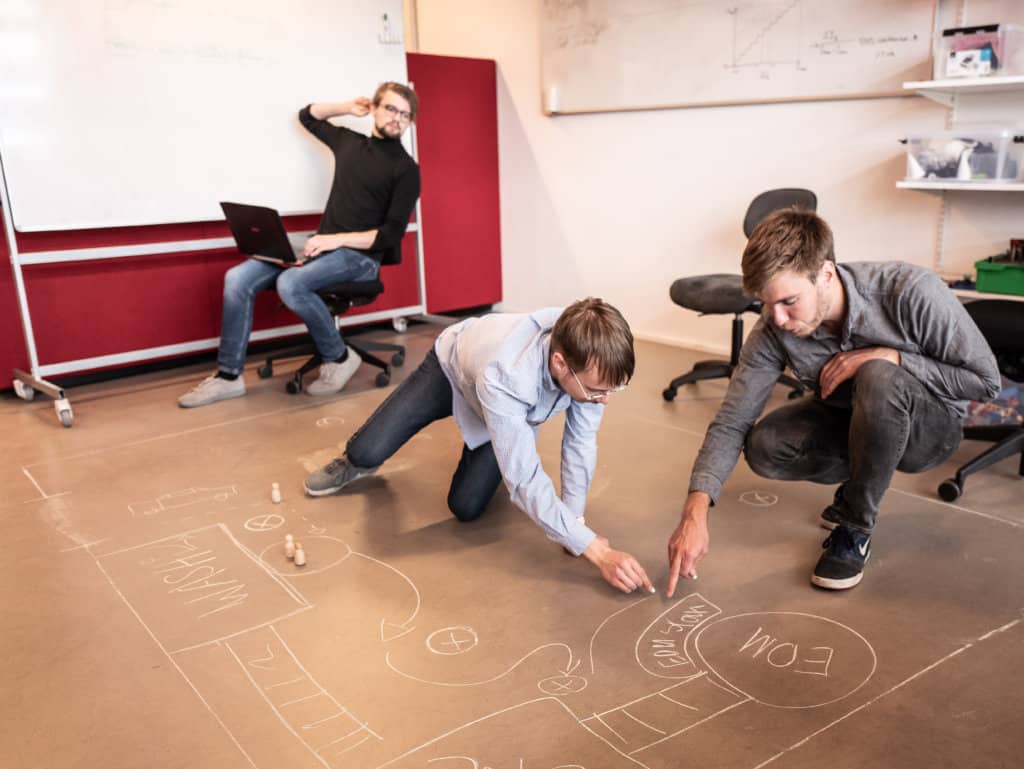
Students are encouraged to work in teams as well as carry out projects in collaboration with those in the Danish industry. Source: University of Southern Denmark
The Faculty of Engineering at SDU now offers Software Engineering in Sønderborg which gives students the ability to develop software solutions of the future, as well as lead the development and implementation of software, collaborate across professional groups and cultures, solve tasks in an international context, advise on investing in new software solutions and more. This programme takes students from the basics to more advanced skills, so you will not require programming skills prior.
Whichever programme you choose, you’ll be set for success. “Thanks to my education I can understand, discuss, and evaluate very complex products and systems, continuously have technical discussions with my customers and the engineering team and support defining the requirements of the future of our product offering,” adds Sánchez. “I think this education has set the right foundation for a curious mind, allowing me to develop not only on technical matters but also on the business, commercial and social aspects of my career.”
Follow The Faculty of Engineering at the University of Southern Denmark on Instagram, LinkedIn and YouTube.






